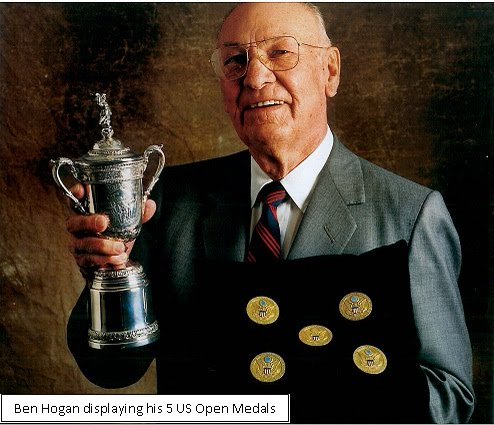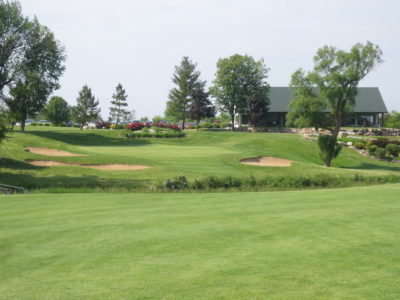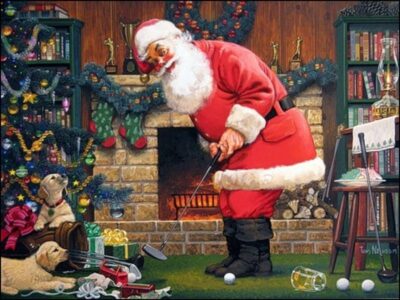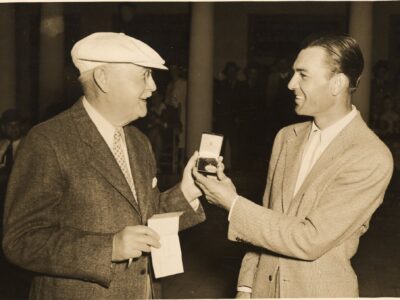By Mike May
As we look forward to the 2023 U.S. Open that will be held at the Los Angeles Country Club, June 15-18, we want to look back at 1953, one of the greatest seasons in major championship history. It was 70 years ago that Ben Hogan won three of golf’s four major championships.
That year, Hogan captured the Masters, U.S. Open, at Oakmont, and the Open Championship, at Carnoustie. It’s unfortunate that Hogan did not have an opportunity to win the fourth major that year, the PGA Championship, due to an overlap in the scheduling that did not allow him sufficient time to return from Scotland for the PGA. It was the only time Hogan ventured across the pond to compete in the OPEN. No other golfer won three majors in one calendar year until Tiger Woods in 2000.
While the vast majority of people who have read about Hogan or even saw him play never actually had the chance to meet the legend. Chuck Ludwig, a Royal Palm Beach, Florida resident, currently the sales & service representative in southeast Florida for Nexbelt, did meet Hogan on several occasions at the annual Hogan Company sales conference, for which Ludwig was then a sales representative.
When asked if Hogan would ever talk fondly of his competitive days on the PGA Tour, he, unfortunately, did not say too much.
“His role during our national sales meetings for the Ben Hogan Company was to introduce the new equipment line and pump us up to go out and sell to the PGA golf professional customers,” said Ludwig.
When asked if Hogan ever said much about his peers such as Sam Snead, Byron Nelson and Jimmy Demaret, he would say very little, but he was quick to identify South African Bobby Locke as the best at match play. Hogan also added that Bobby Jones was probably the most gifted and talented player in golf.
“Hogan did say that Bobby Locke was the best player he played one on one. He added if you want to know how good Booby Jones was, try hitting golf clubs with wooden shafts.”
Hogan was very involved with the design of the clubs bearing his name,
“He was 100% involved with the company’s final product decisions,” according to Ludwig.
Another interesting fact about Hogan’s career centers around his U.S. Open victories. Officially, he has four U.S. Open wins, 1948, 1950, 1951, and 1953. During WWII, in 1942, the USGA did not officially host the U.S. Open, but Hogan won the Hale America National Open Golf Tournament, that was held in its stead.
The USGA felt it was inappropriate to stage the U.S. Open in 1942. In cooperation with the PGA of America and the Chicago District Golf Association, they hosted a war-time substitute for the U.S. Open, the Hale America Open. It was held at the Ridgemoor Country Club near Chicago. For his win, Hogan received a USGA gold medal and $1,200 in war bonds.
The inscription on that 1942 gold medal was the same as it appears on his four official U.S. Open wins, but on the flip side of his 1942 medal, it had different wording, “The Hale American National U.S. Open Championship.”
“At some of our national sales meetings, Mr. Hogan would show the sales reps a small box which included five U.S. Open winner medals,” said Ludwig. “They were all the same, except for the one from 1942. He felt that he won five U.S. Open Championships.”
There are some golf historians and supporters of Hogan who feel that Hogan should be given credit for five U.S. Open wins, since it was conducted just like other U.S. Opens with more than 1,500 entries, local qualifying at 69 sites and sectional qualifying at most major cities. In addition, all of the big names in golf, who were not fighting in WWII, were in the field. To boost local fan interest in the last round, Hogan, who was tied for the lead after three rounds, was paired with the legendary Bobby Jones, who played in the event and was not in contention.
Ludwig also remembers Hogan always played with a U.S. Open-mindset.
“He told us he felt like every golf tournament he played in was the U.S. Open,” said Ludwig.
As talented a golfer as he was, one of Hogan’s finest traits was his ability to respect and honor others, especially PGA teaching pros.
“What a gentleman he was and the respect he had for the PGA golf professional,” concluded Ludwig.










